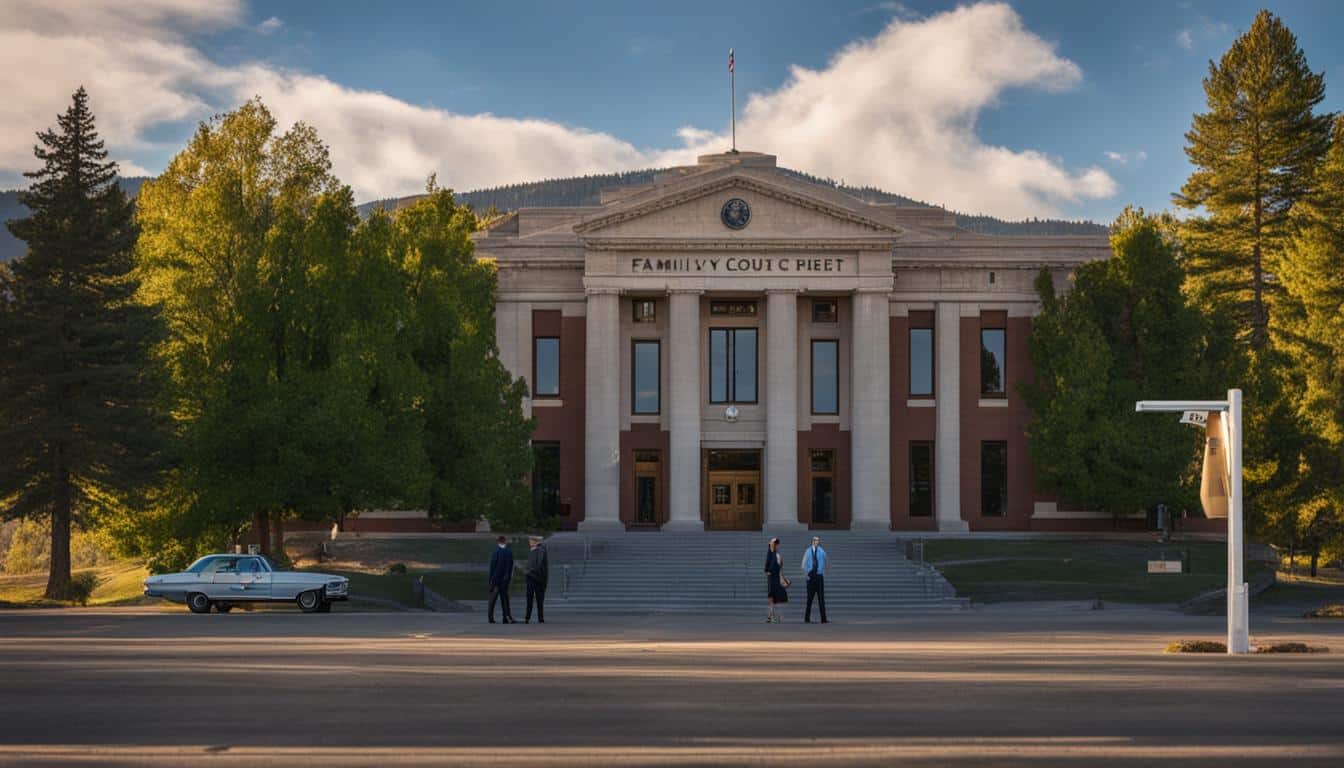Physical Address
304 North Cardinal St.
Dorchester Center, MA 02124
Physical Address
304 North Cardinal St.
Dorchester Center, MA 02124

In the rugged, mountainous landscape of Montana, the process of divorce can seem as daunting as scaling the peaks of the Rockies.
You may wonder, “How long does a divorce take in Montana?” The answer isn’t as straightforward as you might hope. In this breathtaking state, the timeline of a divorce can vary wildly, shaped by unique personal circumstances and legal intricacies.

Whether you’re entangled in a web of complex assets or striving for an amicable split, understanding the timeline is key. Let’s dive into the heart of Montana’s divorce process, unraveling the factors that can stretch or shorten your journey to a new beginning.
Keep reading to gain clarity and set your expectations right – because knowing the path ahead makes all the difference.
In Montana, there is a 21-day waiting period for divorce from the date of serving the divorce petition to the finalization of the divorce. This waiting period allows both spouses time to reflect on their decision and potentially reconcile.
The purpose of the waiting period is to ensure that both parties have had sufficient time to consider the implications of divorce before it becomes final.
During this time, couples have the opportunity to seek counseling, discuss concerns, and possibly resolve their differences.
However, this waiting period does not include the time it takes to complete the entire divorce process, which can vary depending on the specific circumstances of the case.
If you’d like to find out about the costs involved in a Montana divorce, check out our article How Much Does a Divorce Cost in Montana.
Several factors can impact the timeline for a divorce in Montana. These include:
By considering these factors and working with an experienced divorce attorney, couples in Montana can navigate the divorce process more efficiently and potentially minimize the overall timeline.
| Type of Divorce | Average Duration |
|---|---|
| Uncontested Divorce | Minimum of 110 days |
| Contested Divorce | Varies greatly depending on complexity and court backlog |
Note that these durations are just averages and can vary depending on the specific circumstances of each case.

The length of divorce proceedings in Montana can vary depending on the type of divorce.
In uncontested divorces, where both spouses agree on all the main issues, the process can be relatively quick and may take a minimum of 110 days from the date of filing the initial paperwork.
However, contested divorces, where spouses are unable to reach an agreement, can take significantly longer and may involve multiple court hearings, negotiations, and potentially a trial.
The duration of a contested divorce can vary greatly depending on the complexity of the issues involved and the backlog of cases in the court system.
| Type of Divorce | Timeline |
|---|---|
| Uncontested Divorce | Minimum of 110 days from the date of filing |
| Contested Divorce | Varies, depending on complexity and court backlog |
The timeline mentioned here is an estimate and can vary from case to case. To get a more accurate understanding of the timeline for your specific situation, talk with an experienced divorce attorney who can provide personalized guidance.
When it comes to divorce proceedings in Montana, there are several factors that can significantly impact the timeline of the process. Understanding these factors can help you better navigate the legal system and have realistic expectations.
The level of cooperation between you and your spouse can greatly influence how quickly the divorce process moves forward. If you and your spouse are able to reach agreements on important issues such as child custody, division of assets, and spousal support, the process can be expedited.
However, if there are conflicts and disputes that require court intervention, the timeline may be extended.
The complexity of the legal issues involved in your divorce can also impact the timeline. If there are complicated financial matters, business interests, or high-value assets to be divided, it may take longer to reach a resolution.
Similarly, if child custody arrangements are contentious or if there are allegations of domestic violence or substance abuse, the process may be further delayed.
The backlog of cases in the court system can also impact the speed at which your divorce proceedings progress. If the court has a heavy caseload, it may take longer for your case to be scheduled for hearings or trials.
Additionally, the availability of judges and court resources can also affect the timeline.
If you are going through a divorce in Montana and want to expedite the process, there are several steps you can take.
By following these tips, you can potentially minimize delays and reach a resolution more quickly.
One of the key factors that can impact the timeline of a divorce is the level of cooperation between both spouses. If you and your spouse are willing to work together and reach agreements on important issues such as child custody, division of assets, and spousal support, the process can move forward more efficiently.
Avoid unnecessary conflicts and disputes that may require court intervention, as these can significantly prolong the divorce process.
To speed up the divorce process, be organized and prepared with all necessary documentation. Keep important records such as financial statements, tax returns, and property ownership documents in order.
Respond promptly to requests from your attorney or the court, providing any required information or documentation in a timely manner. Being prepared and responsive can help prevent unnecessary delays and keep the process moving forward smoothly.
Seeking the guidance of an experienced divorce attorney can be instrumental in speeding up the divorce process. An attorney who specializes in family law and understands the legal system in Montana can help you navigate the process efficiently.
They can provide you with guidance, handle all necessary paperwork and filings, and represent your best interests in negotiations or court hearings. A skilled attorney can help you avoid common pitfalls and ensure that your case progresses as smoothly as possible.
To avoid unnecessary delays, attend all scheduled court hearings and meetings. Failure to appear can result in rescheduling, which can prolong the overall timeline of your divorce.
Make sure to mark all important dates on your calendar and plan ahead to ensure your attendance. If there are any conflicts or scheduling issues, communicate them in advance to your attorney or the court to make the necessary arrangements.

If you are going through a divorce in Montana and have minor children, there are specific considerations and procedures that you need to be aware of.
In order to file for divorce, the children must have lived in the state for at least six months prior to the filing. This residency requirement ensures that Montana has jurisdiction over matters related to child custody and support.
During the divorce proceedings, child custody, visitation schedules, child support, and other related issues will be addressed.
Be sure to prioritize the best interests of the children and work towards a resolution that provides them with stability and support. The court will take into account factors such as the children’s relationship with each parent, their preferences (if they are old enough to express them), and the ability of each parent to provide a safe and nurturing environment.
| Factors to Consider in Divorce with Children in Montana | Impact on Child Custody | Impact on Child Support |
|---|---|---|
| Child’s relationship with each parent | Significant | May influence the determination of child support |
| The child’s preferences (if they are old enough to express them) | Considered by the court | Not a direct factor, but may indirectly influence child support |
| Each parent’s ability to provide a safe and nurturing environment | Crucial | Does not directly impact child support, but indirectly related to the child’s well-being |
Divorce with children requires careful attention to the unique needs and concerns of the minors involved. By working collaboratively and seeking legal guidance, you can navigate the divorce process in Montana while prioritizing the best interests of your children.
In conclusion, the average time for a divorce in Montana depends on various factors. By understanding the timeline, following the necessary procedures, and exploring options like mediation or collaborative divorce, you can work towards a resolution that is fair and equitable for all parties involved.
To see how the timeline of a divorce in Montana compares to how long it takes in other states, check out our articles about how long does a divorce take in Wyoming and the divorce timeline in Colorado.